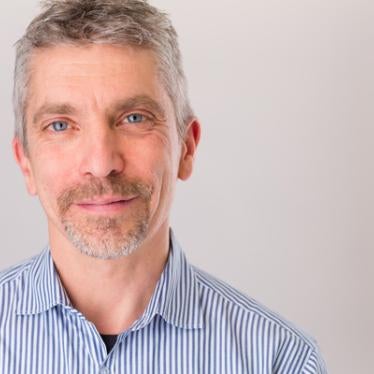Outside Gambia, President Yahya Jammeh is often the subject of satire. He recently claimed to have found a cure for Ebola. In 2007, he announced his home-grown herbal cure for AIDS. He also claims to cure hypertension, asthma, epilepsy and infertility. He conducts exorcisms in his living room, recorded by Gambia’s state-run TV station and then dutifully broadcast to the nation.
Naturally, Jammeh’s outlandish behaviour and penchant for self-promotion delights satirists. But while Jammeh may be a figure of fun from afar, at home his brutal rule is no laughing matter. Few dare speak out against him, as he rules a country with one of the worst human rights records in Africa.
Jammeh’s latest target is the LGBT community. In October he signed a new criminal code that carries punishment of up to life in prison for “aggravated homosexuality”, which is defined in such a way as to include “serial offenders” and people living with HIV who are deemed to be gay or lesbian. The new law has sparked a witch-hunt against LGBT people in Gambia, with at least 14 documented arrests. Some of those rounded up have been tortured. Detainees said they were told that if they did not “confess,” and also provide the names of other so-called offenders, a device would be forced into their anus or vagina to “test” their sexual orientation. Those who can flee have sought refuge in neighbouring Senegal.
The new law is literally a cut and paste from section 3 of Uganda’s notorious Anti-Homosexuality Act, which was set aside by the Constitutional Court there in August. Because Gambia rushed through the new law in relative secrecy, there has been very little outcry against the new code, as there was when Uganda considered its bill.
Gambia’s capital, Banjul, is the home of the African Commission for Human and Peoples’ Rights. Earlier this year the commission passed a resolution condemning violence against LGBT people across the continent, and calling for those responsible to be brought to justice. Yet by passing Gambia’s odious new law, and then presiding over the persecution that swiftly followed, President Jammeh has made himself complicit in such abuses.
Draconian rule
But the fact of the matter is that Jammeh has been a tyrant for 20 years and the anti-LGBT legislation is just the latest manifestation of his draconian rule.
Jammeh, a US-trained former army lieutenant, took power in a bloodless coup two decades ago and maintains power through political patronage, a network of informers, and brutal repression. Jammeh’s ubiquitous secret agents instill acute fear among the population, and ensure that any protest is muted. His private militia, known as “Black-Black” on account of their uniforms, terrorize political opponents, human rights activists and journalists, who are routinely subjected to harassment, death threats, arbitrary arrests, torture, unfair trials and physical assaults.
The line between cruelty and crackpot is paper thin in Gambia: in 2009, the president’s ‘Green Beret’ special guards rounded up more than 1,000 people accused of sorcery and forced them to drink a hallucinogenic liquid to exorcise them.
In 2012, the government executed by firing squad nine randomly selected prisoners accused of murder or treason, in spite of pleas from the African Union and a chorus of diplomatic protest. The authorities shut down several newspapers that dared to cover the protest over the executions.
Later that year Dr. Amadou Scattred Janneh, the former minister of information and communication, was sentenced to life in prison with hard labor. His crime? Printing 100 T-shirts with the slogan “End Dictatorship Now.”
Just last year, Jammeh passed the Information and Communication (Amendment) Act, which forbids spreading “false news.” In a country where the president’s AIDS cure is presented as fact on the government website, it is hard to imagine what spreading “false news” would look like.
Paranoia is another hallmark of Jammeh’s rule. His secret police have been known to arrest people for reacting to his presidential convoy with “indifference.” And megaphones have been banned in the country too, lest they be used to broadcast anti-government messages.
With political opposition and activist groups thwarted in Gambia, the international community has a responsibility to speak out.
Popular tourist destination
Gambia is a popular tourist destination, with over 50,000 visitors per year from the United Kingdom alone. Tourism is Gambia’s economic lifeline. The country is also heavily dependent on development aid, especially from the European Union, and is eligible for preferential trade with the United States. These governments have influence in Gambia and should press for human rights reforms.
Gambians abroad are free to denounce Jammeh as the crackpot dictator he is, while entertainers love the man who provides them with endless comic material. But for the 1.8 million people living in Gambia, his reign of terror is far from funny.








